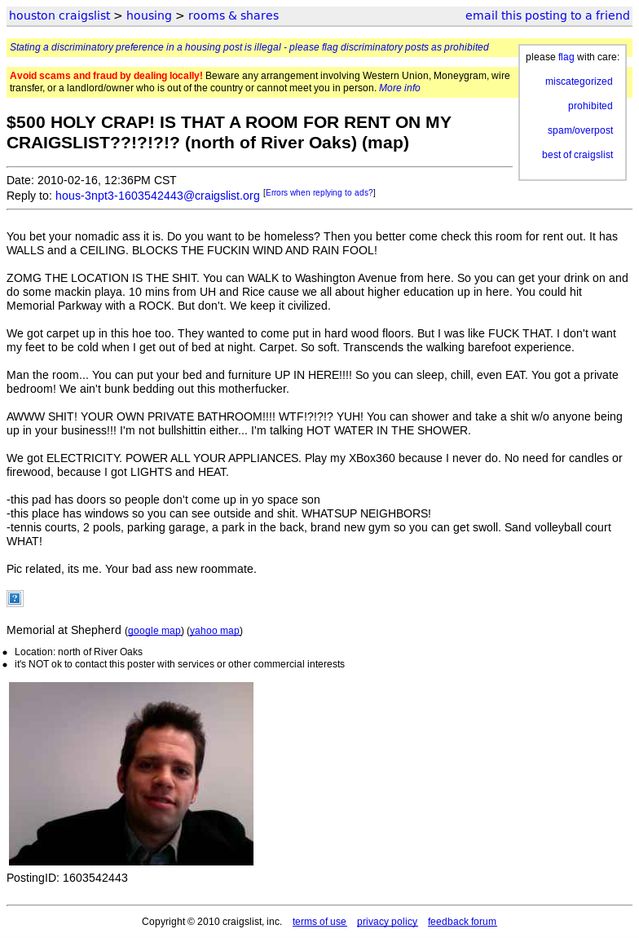Some humor is unambiguously racist. This blog post is not about that kind of humor. It's about something a little more subtle. Consider, as Exhibit A, the following Craig's List ad:

Never mind if it's funny. Personally, I enjoyed the cleverness, but that's a matter of personal taste.
The issue I want to explore is: Is it racist?
I'm going to try to answer my own question, but first I'd like to explicitly define what I mean (and don't mean) by "racist."
"Racial" is not (necessarily) "racist"
The word "racial" is used to describe things pertaining to the social category of "race". As such, surveys that track race-group representation in employment and higher education, or research that examines the effect of perpetrator's or victim's race on sentencing are clearly "racial" in nature.
Whether such surveys are also "racist" depends on how the information is used. If the information is used to oppress or otherwise deride a racial group or elevate a more powerful racial group, it is racist. In contrast, if the goal is to track racial data in order to ensure racial equity, then the racial data are not only not racist, they are, in my way of thinking, anti-racist.
I apply the same distinction to humor. Jokes that seek to put a racial outgroup down are, in my way of thinking, racist. Those that make fun of racial dynamics, racial stereotypes, or even racial inequality are not.
Not everyone agrees with this distinction.
Neoconservatives tend to categorize any acknowledgment of race as "racism." From my perspective this is a disingenuous and calculated response that is actually "racist" in nature, because its purpose is to obscure the racial inequity present in our society by making such record keeping taboo and silencing the activists that would bring such data to public attention.
But back to the Craig's List ad. We might start by asking if it's even racial. It's not explicitly so. There is no mention of race or any racial groups. There is not even any terminology that is often associated with racial status, no mention of racism or prejudice or profiling. There are certainly no racial epithets.
And yet, I do think the ad is unmistakably racial. The language it uses, the actual words, as well as the word structure is easily recognizable as an exaggerated form of Black English. In fairness, some members of other groups have adopted this linguistic style too, but I would argue that its origin is in the Black community and that it continues to be most associated with Black street culture.
But is it rac-ist?
To determine that, let's look at the impact the ad is likely to have on those that see it. Does it elevate one group and/or put another one down?
The answer is rather complicated and depends on a variety of factors, including the race of the person making the joke, the audience at which the joke is directed, and the specific sociopolitical context in which the joke is told. Let's examine these one at a time:
In this case, the person who posted the ad is white. His picture is in the actual ad. As such, he is presumed to have less legitimacy in taking on the affectations of Black culture because this culture is not his own. For the same reason, he also has less freedom to ridicule it.
When members of a group make fun of their own group, they are, at least in part, making fun of themselves. This doesn't give them free reign to say/do anything they like. To the contrary, self-criticism disguised as humor can be very damaging, because it is more likely to be seen as truthful and unbiased. After all, the reasoning goes, if they say "that" about themselves, it must be true. But this is a topic for another post. Here I want to stress that those outside the ingroup are required to tread more carefully. As outsiders, their comments will be perceived differently (usually with a more hostile bias) than if they were made by someone within the group.
Does this seems unfair? If fairness equals sameness, then I suppose it is. But most of us instinctively understand and endorse this double standard. We tease our siblings and close friends but usually take offense to outsiders doing the same thing (the "dozens" a verbal contest consisting of making fun of the opponent's "momma" is a notable exception, but one that has clear rules of engagement). This seems right to us. Fairness here is not in the sameness of the behavior but in the recognition of the fact that being teased by someone who knows you and loves you is different than being made fun of someone who doesn't.
The audience matters too. It's one thing to make fun of a group to their face and quite another to do it behind their back. In the case of the former, if there is not a significant power discrepancy favoring the speaker, there is built-in accountability. The audience, after all, has its own voice and can, therefore, stand up (sometimes literally) and defend itself.
In this case, the audience of the ad is somewhat ambiguous, but we can make some reasonable deductions. According to the ad, the apartment is located "north of River Oaks", Texas. Given that the River Oaks demographics are 85% white and less than half of 1% Black, it seems likely that the ad is directed at a predominantly white audience.
As for the sociopolitical context, groups with less political and economic power generally have more freedom to make fun of groups with power than vice versa. In this context, this kind of speech serves as a form of resistance and protest. It can even be inspirational. The underdog, after all, is just trying to survive and achieve some sense of equality. Knocking the dominant power structure down a bit (especially symbolically, via humor) feels good to us, because it increases equality. In contrast, having someone powerful poke fun of someone weaker is analogous to bullying.
The bullying in this ad is far from obvious. To the contrary, it is remarkably subtle, so subtle, in fact, that many readers will perceive it as an expression of admiration and praise. And it might well have been intended as such. I don't know the author of the ad and am not interested in judging him in any way. But good intentions do not preclude a racist impact, and that's exactly what this ad produces.
Coming from a white male and directed at what is likely to be a predominantly white audience, in a society in which white people continue to have a disproportionate share of economic and political power, the ad invites its readers to laugh at, rather than with those that speak in this dialect. As such, the status of those who use Black English is symbolically lowered, while at the same time the ad author's status is raised by his implied linguistic superiority (we are to presume that he doesn't usually talk this way), as well as by his ability to take on the linguistic affectations for comic effect.
Is this ad racist? It is. You just have to read between the lines.
______________________________
For more racial analysis of news and popular culture, join the | Between The Lines | Facebook page and follow Mikhail on Twitter.




